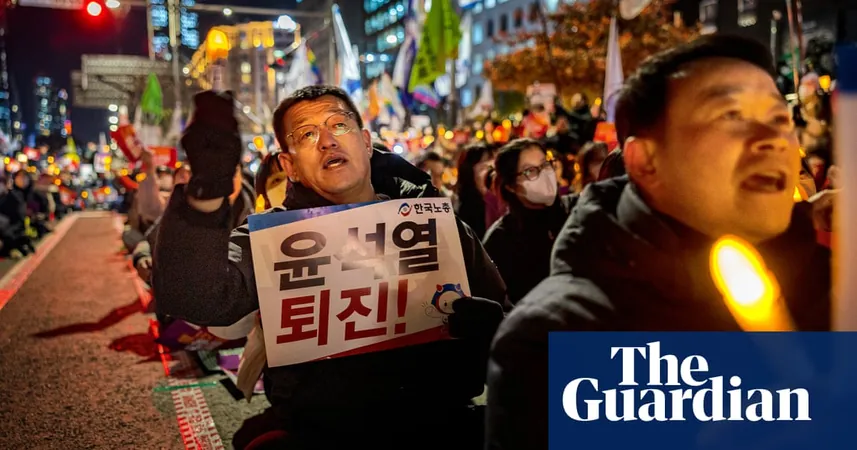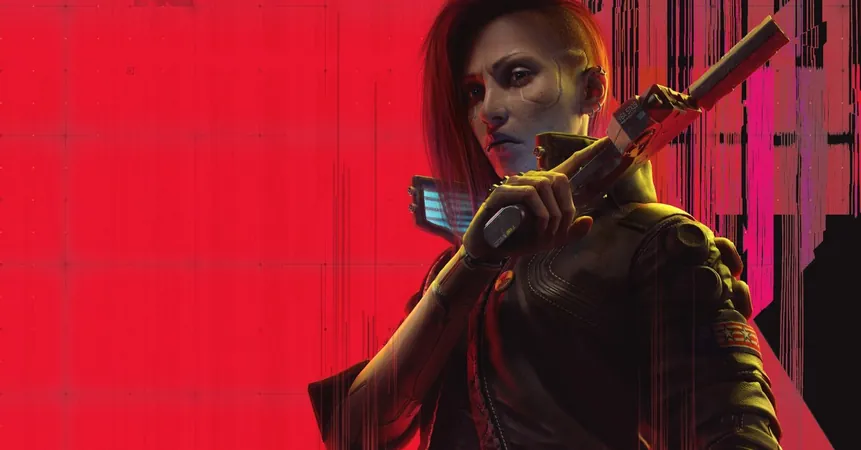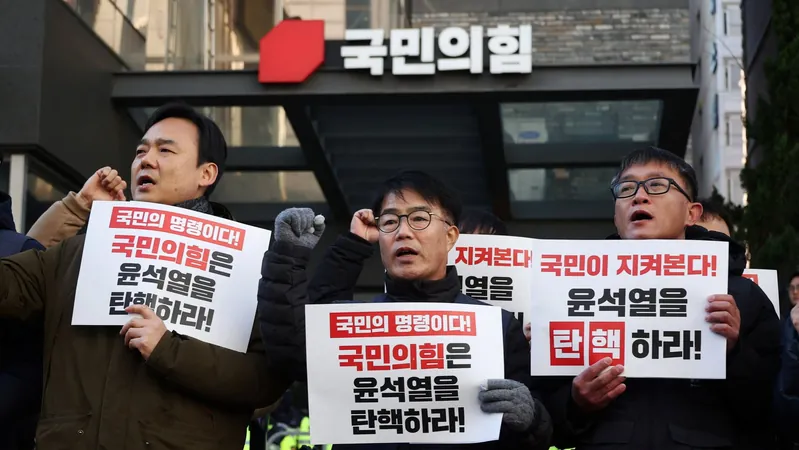
South Korea's Struggle Between Soft Power and Authoritarianism: A Democracy at Risk
2024-12-06
Author: Jia
Introduction
South Korea has emerged as a global powerhouse in soft power, largely due to its cultural exports like K-pop, highlighted by the massive success of BTS. This phenomenon, known as the Korean Wave or Hallyu, transformed South Korea from an obscure nation into a cultural giant, captivating audiences worldwide. But just as excitement built for the anticipated second season of Netflix's blockbuster 'Squid Game,' a shocking twist unfolded in real life.
Authoritarian Shift
In a startling move, President Yoon Suk Yeol announced the imposition of martial law aimed at dismantling 'anti-state forces' and quelling political dissent that obstructed his agenda. This authoritarian shift lasted only six hours before Yoon retreated after facing bipartisan pushback in Parliament. The swift reversal came too late to prevent international condemnation, with the US, Japan, and the UK expressing 'grave concern' over the fleeting authoritarian grip.
Impact on Citizens
The juxtaposition of South Korea's vibrant culture and its political turmoil shocked many around the globe. For younger, internationally-minded citizens, the events served as a harsh introduction to the darker chapters of their country's past, evoking painful memories for older generations who lived through periods of military dictatorship and violent repression of dissent.
Clash Outside National Assembly
At the heart of this crisis was a dramatic scene outside the National Assembly, where lawmakers clashed with soldiers in an attempt to reclaim their democratic rights under the watchful eye of military helicopters. As fears festered over the uncertainty of the government’s next steps, residents in Seoul were left grappling with the potential fallout from this authoritarian overreach.
Public Sentiment
'Our reputation has taken a massive hit,' lamented Kim Jung-ho, a local resident. 'We were just basking in accolades, especially with Han Kang winning the Nobel Prize, and then this happens!' Yet not everyone perceived the situation bleakly. Law student Bang Kyeong-rok noted that the swift mobilization of lawmakers and citizens in defense of democracy showcased South Korea's resilience. 'This was a wake-up call; it exposed the strength of our democratic spirit,' he explained.
Historical Context
Since the Korean War, South Korea has emerged as the fourth-largest economy in Asia, yet deep-seated authoritarian tendencies remain prevalent within its institutions. The recent crisis also highlighted the troubling role of Yoon's high school connections, raising questions about entrenched power dynamics that could threaten democratic progress.
Consequences of Martial Law
Had martial law persisted beyond those chaotic hours, the consequences could have been dire: political activity would have ground to a halt, curfews imposed, and stringent media censorship enacted. This chilling scenario seemed to echo North Korea’s oppressive regime, with Yoon's administration identifying key opposition figures without credible evidence, framing them as threats tied to the North.
Fear for the Future
'I fear the long-term implications of this reckless act,' said Nam Jae-sun, a small business owner. 'This isn't just about our international image; it's a threat to the hard-earned democratic freedoms.'
Historical Lessons
Historically, South Korea has witnessed the peril of martial law. In 1988, the country sought to emerge from decades of military rule, marked by coups and violent crackdowns on protests, such as the tragic Gwangju incident. The struggle for democracy has been hard-fought, with pivotal moments like the 1987 protests leading to real reforms. The current situation, with memories of past oppression resurfacing, has resonated strongly among older citizens and raised alarms for those who assumed such days were long gone.
Reflections on the Crisis
Reflecting on the ramifications of the recent turmoil, youth worker Bang Jeeyoung expressed a mixture of disbelief and hope. 'I thought it was fake news when I heard about martial law. But this could be our chance to confront and eliminate the remnants of authoritarianism that linger.'
Political Unrest and Impeachment
As it became clear that parliamentary support for Yoon was waning, the drama unfolded alongside mass protests that could see upwards of 200,000 citizens demanding action in response to this alarming event. With the political landscape shifting rapidly, the leaders of Yoon's party began to distance themselves from the president, raising the specter of possible impeachment.
Crossroads for Democracy
As the nation approached a critical vote in Parliament, South Koreans were left at a crossroads: Would they reclaim their democratic principles, or descend into a past best left behind? The outcome could redefine the future of democracy in South Korea, as the world watches this unfolding saga with bated breath.



 Brasil (PT)
Brasil (PT)
 Canada (EN)
Canada (EN)
 Chile (ES)
Chile (ES)
 España (ES)
España (ES)
 France (FR)
France (FR)
 Hong Kong (EN)
Hong Kong (EN)
 Italia (IT)
Italia (IT)
 日本 (JA)
日本 (JA)
 Magyarország (HU)
Magyarország (HU)
 Norge (NO)
Norge (NO)
 Polska (PL)
Polska (PL)
 Schweiz (DE)
Schweiz (DE)
 Singapore (EN)
Singapore (EN)
 Sverige (SV)
Sverige (SV)
 Suomi (FI)
Suomi (FI)
 Türkiye (TR)
Türkiye (TR)